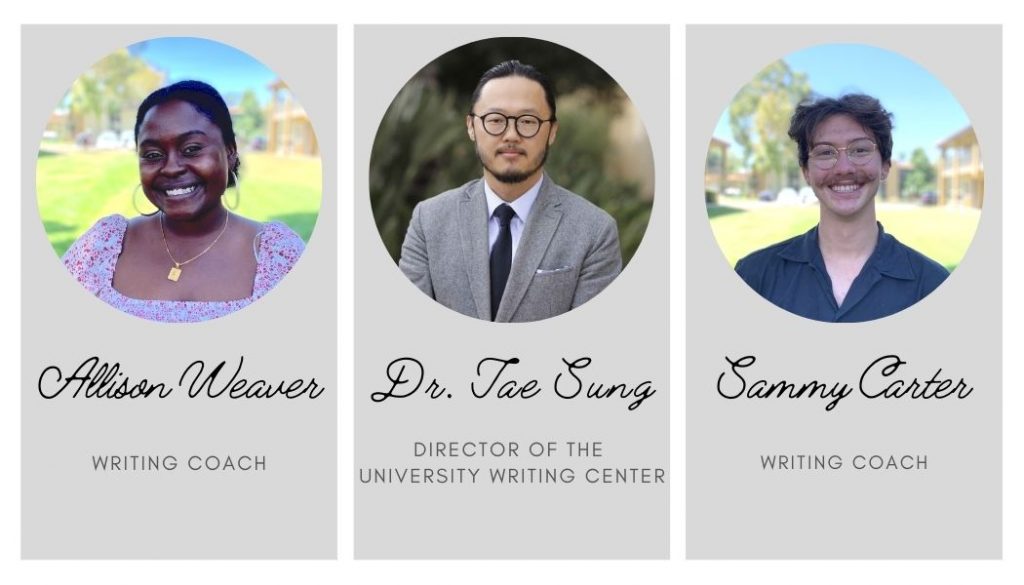In a recent blog series, Dr. Smith explored some ideas and tools for writing well (you can find an overview of the series here). An important resource available to you as a CBU student is the University Writing Center (UWC). Read on to hear from the Director of the UWC and two of the UWC’s Writing Coaches to learn how they may help shape the development of your writing skills!

From Dr. Tae Sung, Director of the University Writing Center
I don’t know about you. But I never thought I would ever go back to school after college. I remember completing my last final exam and thanking God I would never have to take another class. After all, Jesus gathered a bunch of fishermen—not degrees—to be his disciples, right?
It is true… But after several years of serving God in full-time ministry, I also began to see that fishing wasn’t the only skill God needed. There’s Paul, for example, who lists his many accomplishments in his letter to the Philippians, which must have equaled at least to a master’s degree. Sure, he considered it all a loss compared to the surpassing greatness of knowing Jesus. But there’s still a reason why he wrote almost half the New Testament. Peter, one of the fishermen, barely wrote six pages in my Bible.
Once I realized that God calls different people to serve as different parts of one body—some like Peter without higher education and others like Paul with a lot of it—I had this fishy suspicion that God was calling me to the very thing I thought I would never have to do. I still serve the church. But no one including myself would have guessed I would go on from a master’s to a doctoral degree and become a university professor.

That transition from a youth pastor to a university professor, however, was far from easy. When I first began my graduate studies in an M.A. program, I was lost in at least two ways and unsure if I would ever be found again. The first challenge was realizing that graduate studies was less about getting a degree and more about becoming a professional in my field of study. It wasn’t just about doing literary criticism; it was about becoming a literary critic. Likewise, for you, it’s no longer just about doing this or that assignment; it’s now about becoming a scholar in your discourse community.
Related to the first was a second challenge that had to do with my writing and communication. A big part of my problem was that over the years I began to rely on some bad habits and cheap tricks that no longer worked. I was so worried about my grammar and vocabulary that I failed to persuade anybody of what I was saying. It was not possible anymore to be satisfied with being a bad or mediocre writer. And it wasn’t just because I was in an English program. Effective writing and communication, in case you haven’t realized already, are essential to every profession out there. And a lot of times, they are the reasons why some people keep moving up and others don’t.
The University Writing Center exists to remind you that the two challenges above are related. Becoming a professional means being an effective writer and communicator in the profession. This is not an easy task. But with the proper foundation, the mystery of writing will begin to dissipate and you’ll see more clearly how you can improve with some hard work. One key principle that you’ll need to remember is that writing is not just about correct grammar or number of paragraphs but, more importantly, about greater awareness of your credibility, audience, and purpose.
Below, you’ll read from two of our writing coaches. Allison will share what she’s learned from the Writing Center and Sammy will share how the Writing Center can help you.

What I Learned from My First Appointment and Since Becoming a Writing Coach
By Allison Weaver, Writing Coach
I realized I needed help when I received the grade for my first college writing assignment. I had always thought of myself as a decent writer, but it became clear that even good writing could always become better. And what I have learned since my first appointment with the Writing Center is that becoming a better writer had less to do with checking off a list of requirements and fixing my grammar and more to do with learning how to engage in an academic conversation.
Now that I am a writing coach, I have gained a better understanding of what a purpose-driven writer should look like. The leading element to purpose-driven writing is writing clearly and persuasively. That’s the secret to a well written paper! This is something most students aspire for their writing to be once they leave a writing center appointment. It is most important as writers that we provide all the information upfront then guide our readers step-by-step to how we got our conclusion. By doing this, readers are able to see the well-developed format of your paper, leaving no room for confusion. Once you have mastered this element of your paper, it is now onto articulating your words in such a way that persuades your reader you know the material well. As writing center coaches, credibility is crucial. Stating your ethos will allow for your argument (logos) to better compliment your academic tone which is achieved through your pathos.

How the Writing Center Can Help You
By Sammy Carter, Writing Coach
To accommodate each student’s availability, the Writing Center offers three types of appointments: on-campus, online, and email. Each type is also designed with different stages of writing in mind. So, online appointments are usually best for the prewriting or outlining stage, while email appointments are usually better for complete drafts. On-campus appointments can go both ways with the added benefit of being able to talk with your writing coach in person.
Even if a writing coach is unfamiliar with your particular subject, we are all trained to offer a general academic reader’s feedback to help with the clarity of your structure and the persuasiveness of your argument. If you need help with your sentences and grammar, we provide additional support through Grammarly, which you can sign up for at our website free of charge.
Also, on our website, you can find other great resources like our video tutorials, as well as opportunities like our yearly Distinguished Public Lecture series, where we invite influential writers to share their work with the CBU community. Our first lecture last year was given by Nancy Duarte, CEO of one of the largest communication firms in Silicon Valley. We are hoping to release a study guide soon for you to dive deeper into DataStory and incorporate her insights into your own writing, just as we are getting ready to announce our next exciting speaker.
